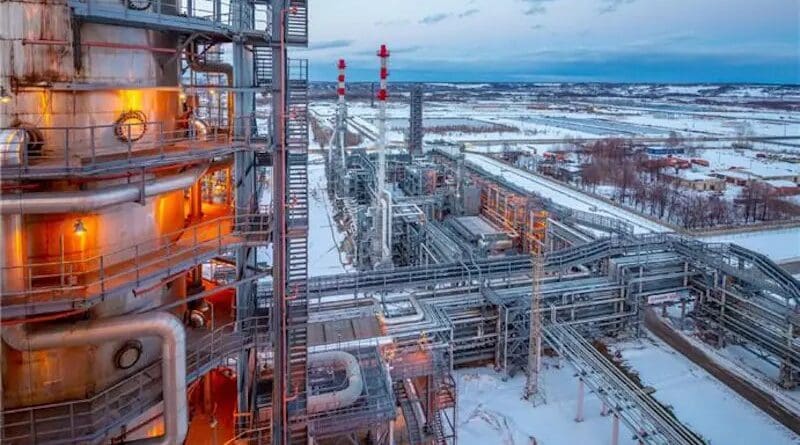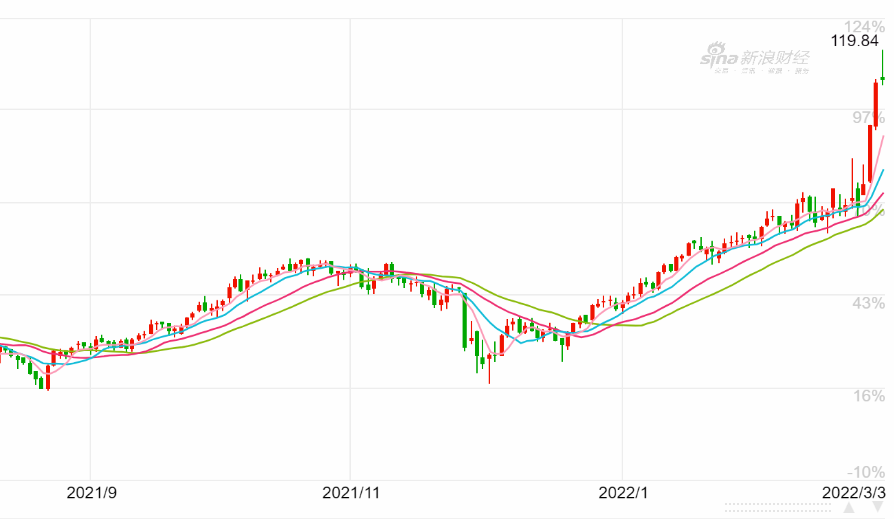The Russia-Ukraine Crisis And The Global Energy Transition – Analysis
By Anbound
The Russia-Ukraine crisis has not only changed the geopolitical landscape, but also profoundly altered the global energy balance.
Since the escalation of the conflict between Russia and Ukraine, geopolitical risks have stimulated a sharp rise in international oil prices. Since February 21, 2022, when Russia recognized two breakaway regions in eastern Ukraine as independent entities until March 2, the price of Brent crude oil rose 17.6%., from $97.38 to $114.5; the price of Crude Oil WTI rose 20%, from $92.8 to $111.38. On March 2, the gas price at the Dutch TTF hub, the benchmark gas price for Europe, soared to a record high to over 194 euro per megawatt-hour, equivalent to more than 2,000 euro per 1,000 cubic meters of gas.
A substantial increase in oil prices would raise industrial and consumer expenses, increasing the possibility of global inflation, which will have an impact on the global economy. For major oil and gas importers, rising oil prices will make them to bear much more. European countries, China, Japan, etc. that import large amounts of oil and natural gas are likely to be the countries that will be the hardest hit as the oil and gas prices soar. Since December 31, 2021, China’s refined oil prices ushered in “five consecutive rises” (including March 3), with gasoline rising by 1,265 yuan per ton and diesel by 1,220 yuan per ton. On March 3, Japanese Prime Minister Fumio Kishida said that in order to minimize the negative impact of soaring energy prices on the Japanese economy, the country will further commit to saving energy and make efforts to reduce the use of oil and natural gas as much as possible.
Figure: Brent crude oil prices have continued to rise since the second half of last year.
The substantial jump in worldwide oil prices is attributable to the increased risk premium caused by the Russia-Ukraine dispute. However, it is worth noting that, in contrast to the past, the dramatic changes in the global geopolitical landscape triggered by the Russia-Ukraine crisis have caused a profound cascading impact on the global energy market and the energy industry landscape. As a result. this structural impact is triggering a major change in the global energy market.
Europe’s and Russia’s energy supply and demand systems will suffer a major blow. In 2021, Russia’s crude oil production was about 520 million tons, ranking third in the world, after the United States and Saudi Arabia; natural gas production of 761 billion cubic meters, ranking second in the world, accounting for about 18% of the world’s total natural gas production, second only to the United States. In 2021, Russia exported about 230 million tons of oil, ranking second in the world after Saudi Arabia, and about 200 billion cubic meters of natural gas, ranking first in the world. 80% of Russia’s natural gas exports are sold to Europe. In 2020, about 30% of Europe’s natural gas was supplied by Russia, which Russian supply was more than 38% of the total of gas to the European Union’s 27 member states. In terms of countries, the Czech Republic, Latvia, Moldova, and Hungary get more than 95% of their domestic gas supply from Russia; Finland and Germany more than 65%, Poland more than 50%; Romania, Italy, and Greece about 40%; the Netherlands about 26%; France, Sweden, and Spain more than 10%. Although the Western countries do not currently include Russian energy exports in their sanctions, the existing sanctions will sooner or later shake Russia’s energy relations with Europe.
Geopolitical factors have also pushed the massive withdrawal of international capitals from Russia’s energy industry. Following the escalation of the Russia-Ukraine crisis, sanctions by Western countries have led to a large amount of European and American capital leaving Russia’s energy sectors. To date, nine multinational oil companies either have announced their withdrawal from Russia-related oil and gas cooperation projects or expressed their concerns regarding the Ukraine crisis. Among the oil companies that have announced their withdrawal are British Petroleum (BP), Norwegian National Oil Company (Equinor), Shell, ExxonMobil, and Spain’s Repsol. According to incomplete statistics from public disclosure, the value of assets and related earnings that the above-mentioned multinational oil companies have made in Russia amounts to at least $34 billion. In addition, the Norwegian government has also claimed its sovereign wealth fund to exit from Russia. It should be pointed out the investments by many European energy companies in Russia that began after the collapse of the Soviet Union and have lasted for up to 30 years.
Because of geopolitical and supply-demand ties, Europe has a long history of energy cooperation with Russia that its determination to expand its links with Europe has increased the Russian-European energy partnership. As the Russia-Ukraine situation worsens, the long-standing energy cooperation between the two countries will be shattered. Temporarily, the United States and European direct sanction measures against Russia do not include energy sanctions (because of the significant demand for Russian energy), but energy sanctions could happen at any time. Noticeably, the Nord Stream 2 gas pipeline project between Russia and Germany has been suspended. The Nord Stream 2 management company has filed for bankruptcy. It is not hard to destroy an energy partnership, however, it is not easy to build a stable one. Such “disruptive disruptions” due to political factors will destroy the existing system of energy investment and supply-demand, and will be difficult to restructure one in a short period.
In view of the consequences of the Russia-Ukraine situation, European nations will strive to reform their energy security system. Researchers at ANBOUND predicted that the following changes will take place in Europe:
First, look for new sources of energy supply other than Russia. From the European point of view, this is the most important approach to completely guarantee Europe’s energy security. However, European energy demand tells extremely difficult and costly to exclude Russia to build energy security. According to the Directorate-General for Energy for the EU, the largest importer of natural gas in the world in 2021 is the EU, with the largest share of its gas coming from Russia (41%), Norway (24%) and Algeria (11%). We estimate that if Europe reduces its access to energy from Russia, one of the biggest beneficiaries will be the major United States producers.
Second, Europe will restructure its consumption structure, for example by restarting or increasing coal applications and delaying or abolishing nuclear abandonment. German Economy and Climate Minister Robert Habeck has stated that the country is considering extending the lifespan of its existing nuclear power reactors to safeguard the country’s energy supply in the face of uncertainty about Russian gas supplies. After the disaster at Japan’s Fukushima Germany has announced to shut down all its nuclear plants by 2022, making it the first industrialized country to abandon nuclear power. Not just nuclear energy, but all coal-fired power facilities will be closed by 2038, and natural gas would be phased out by 2050, according to Germany’s plan. Against a backdrop of geopolitical crisit, all of these highly green and ecologically beneficial initiatives have devolved into costly “children’s games.”
Third, the impact of the changing global energy supply pattern on China. Geopolitical upheaval in the global energy supply and demand sector will dampen Russia’s oil and gas exports but will increase energy demand for the Middle East, the United States, Africa, and Australia. As the country with the largest energy demand in the world, China shall adjust its energy strategy in response to the changing situation. On the one hand, the climate for China to get energy supplies from Russia may improve in the future, while this would tighten China’s energy supply “connection” to Russia; on the other hand, China may face stronger competition when importing energy from other regions or investing in energy. In particular, the future global supply of energy will be further linked to geopolitical factors. There would have more “political” interferences to the international markets.
Final Analysis Conclusion:
The escalation of the Russia-Ukraine crisis is a strong catalyst to stimulate changes in the international energy market. Meanwhile, the energy supply and demand systems between Russia and European countries will be dealt a major blow. As a result, the global energy market’s pattern will be altered. Since China is the largest energy consumer and oil importer, geopolitical changes will continue to affect China’s energy security.


